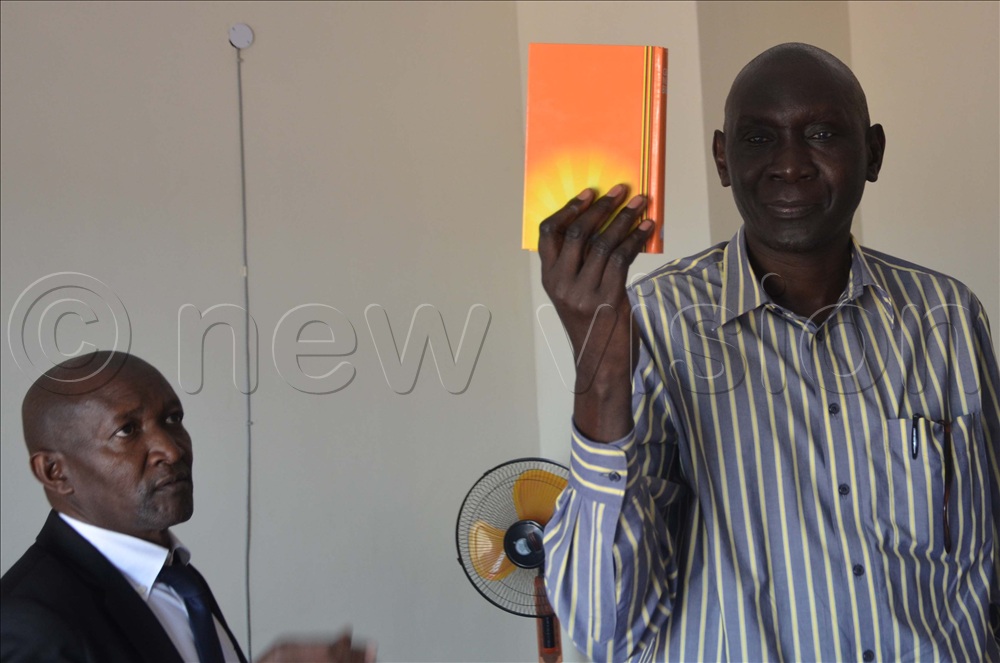Uganda Human Rights Commission dismisses compensation cases over false claims
The cases were brought by Gumex Okwanga, who alleged that a police officer killed his nephew, Tonny Odongo, a former inmate who claimed he was tortured by a prison warder and one Richard Okweny.
Ongoing session at Uganda Human Rights Commission (UHRC) office in Lira City on Wednesday, September 24. (Photos by Patrick Okino)
________________
The Uganda Human Rights Commission has dismissed two cases filed against the Attorney General, citing fabricated claims and inconsistent testimonies intended to defraud the government.
The cases were brought by Gumex Okwanga, who alleged that a police officer killed his nephew, Tonny Odongo, a former inmate who claimed he was tortured by a prison warder and one Richard Okweny.
The tribunal, chaired by Mariam Fauzat Wangadya, delivered the ruling at the Human Rights Regional Office in Lira City on Wednesday, September 24. These are part of 16 cases currently being heard by the tribunal sitting in Lira.
Odongo, of Acanako Village in Lira District, alleged that he and other inmates were taken from Lira Main Prison to work at a private garden in Boke.
While they were working in the garden, two inmates escaped. In response, prison warders opened fire.
Odongo claims that he was immediately arrested, tied to a tree with a rope, and severely beaten by the prison officers, sustaining severe injuries.
In his 2014 statement, however, Odongo admitted that he was among the inmates who escaped from the cassava garden, claiming he was influenced by a fellow inmate.
However, during cross-examination by the Uganda Human Rights Commission, Odongo denied ever attempting to escape.
Isaac Ojok, a complainant taking oaths during Tribunal on Wednesday.
He argued that the initial statement was inaccurately recorded by the person who took it.
When asked directly by the tribunal, “Tell us the truth, when the two inmates escaped, didn’t you also escape?” — Odongo denied the allegation.
The tribunal also questioned Odongo about his earlier statement in which he claimed to have given sh150,000 to a prison officer to avoid being formally charged with escape.
However, under cross-examination, Odongo also denied making any such payment, insisting that as an inmate, he had no access to money and could not have bribed any officer.
Odongo further claimed that upon his release, he was admitted to Lira University Hospital for treatment related to the alleged beating. However, the tribunal, led by Chairperson Wangadya, rejected this claim, stating there was no record of such hospitalisation in the commission’s files.
Meanwhile, Okwanga alleged that his nephew, Okweny, was arrested and detained at Dokolo Police Station, and was later shot and killed by police officers. However, the Uganda Human Rights Commission raised serious doubts about the credibility of this claim.
Wangadya stated that upon review, it was discovered that Okwanga is not the biological father of the deceased, and that the investigation into the alleged killing was incomplete.
“There is no sufficient evidence on file to validate the claims,” Wangadya said.
She also noted discrepancies in the official records. According to case files reviewed from both the Dokolo Police and Lira Magistrate’s Court, the charge against the accused officer — initially registered as murder — was later reduced to manslaughter. The suspect, identified as Owani, was eventually released, and the case dismissed by the court.
Pauline Nansamba Mutumba, the Director for Complaints, Investigations, and Legal Services at the Uganda Human Rights Commission (UHRC), has acknowledged that some cases before the tribunal have taken more than 16 years to resolve due to persistent resource constraints.
She said the government has provided resources to the Commission, and so far, has held tribunal sessions in five regions and disposed of about 65 cases.
When asked why many complainants and witnesses were retracting or contradicting their earlier statements, Mutumba explained that a number of them have prior conflicts with the law, and their records may not always be consistent or credible.
"Sometimes, a complainant may feel ashamed of their past actions and choose to deny them later. But we always encourage both complainants and witnesses to stick to the truth and state exactly what happened. The moment you create doubt in the minds of the tribunal, it can significantly affect the outcome of your case," she warned.
Mutumba emphasised that forgery and fraudulent claims remain a major concern.
“Fraud and forgery are issues that concern all of us — both the complainants who bring the cases and our investigators. That’s why it's important to thoroughly analyse and verify every piece of evidence we receive,” she said.